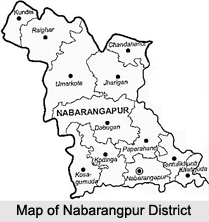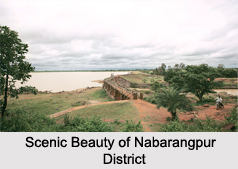 Nabarangpur District is located in the south west district of Odisha, is situated in the midst of nature. Nabarangpur District has a unique culture and history. The people living here are also quite interesting. Home to more than ten tribes, and with more than half the population being tribal, Nabarangpur district has a vibrant life style.
Nabarangpur District is located in the south west district of Odisha, is situated in the midst of nature. Nabarangpur District has a unique culture and history. The people living here are also quite interesting. Home to more than ten tribes, and with more than half the population being tribal, Nabarangpur district has a vibrant life style.
Location of Nabarangpur District
Nabarangpur district is located in the district of Odisha. The district headquarters is in the city of Nabarangpur. Situated in the south west corners of Odisha, Nabarangpur district`s boundary stretches in the north to Kalahandi district, west to Jagdalpur district, east to Kalahandi and Rayagada district and south to Koraput District. The Indravati River forms the border between Nabarangpur and Koraput districts. It lies at 19.14` latitude and 82.32` longitude at an average elevation of 1,876 feet (572 m).
History of Nabarangpur District
History of Nabarangpur is inextricably interlinked with that of Koraput District ruled by the Solar Dynasty of Jeypore. It was ruled by the rulers of solar dynasty. The language, life style, heritage, geographical location, flora and fauna and even climate of Nabarangpur are not dissimilar from the rest of the component of Koraput district. The Atavika people were native of Koraput, and valiantly fought the Kalinga war in the 3rd century BC. The Satavahans, the Ikshvakus, and the Nalas ruled subsequently ruled over the Nabarangpur district. During the 14th century the region came under the authority of the British Empire. The district of Nabarangpur came into being much later on 2nd October 1992.
 Geography of Nabarangpur District
Geography of Nabarangpur District
Nabarangpur district experiences the first arrival of monsoon where as the rest of the state take about ten days more for the same ecstasy. While the rest of Odisha gets rain due to monsoon from the Bay of Bengal, the whole of Nabarangpur derives it straight from the Arabian Sea through the Southwest direction. Nabarangpur enjoys adequate rainfall and there is hardly any dry spell, acute shortage of food, or drought.
People of Nabarangpur District
There are several tribes dwelling in the district of Nabarangpur. Nomadic and aboriginal inhabitants also live here. Encounter with the settled and urban population has changed the lifestyle of the tribal people but few choose to continue with their primitive way of living. The main language spoken here is Oriya. Hindus, Muslims and Christianity are the three major religion practiced in this district of Orissa.
Culture of Nabarangpur District
Culture of Nabarangpur is quite fascinating. The main Hindu festivals celebrated here are Ratha Yatra, Maha Shiva Ratri, holi and Dusshera. Both the town dwellers and tribal people come together to mark these occasions. Holi, the riotous festival of spring is a three day long celebration. The Ratha Yatra is the biggest festival celebrated here. The presiding deity is Lord Jagannath. Dussehra is again a ten-day long Hindu festival, a time in which Goddess Durga, epitome of power and energy, motherhood of the whole universe, is worshipped with due fervour and solemnity. The Muharam of the Muslims is a day of prayer and remembrance. The Christmas Day marks the beginning of a long festival running up to the New Year`s Day. Christians of all hues celebrate at home, churches and open fields.
Tourism in Nabarangpur District
Tourism in Nabarangpur is undoubtedly a fascinating experience. The ancient temples are noteworthy of their mythological importance and architectural splendour. Maa Pendrani temple, Maa Bhandargharani temple and Lord Jagannath temple are much visited places of this district. Pilgrim tourists come here to offer their prayers and get blessings. The temples are also noted for their architectural wonder. The dams of this district serve as great picnic spots for the visitors. The Sahid Minar and the Sahid Smriti Stambha are the two famous historical monuments of Nabarangpur district. The Deer Park here also attracts a large crowd. Watching Nature`s bounties from the watch Tower in this park is a unique experience. Gosein Dorah and Chandan Dhara are the natural waterfalls which are huge crowd pullers. When it comes to tourism, this south western state of Odisha has a lot to offer.
Related Articles:
Odisha, Indian state
Temples of Odisha
Districts of Odisha






